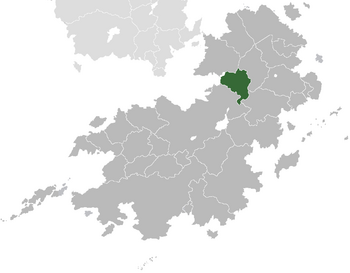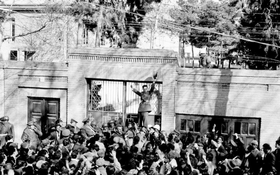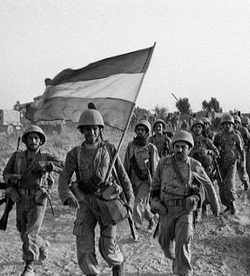United Rahelian People's Republic
Jump to navigation
Jump to search
Irvadi People's Republic (Badawiyan): جمهورية رحلان الشعبية المتحدة al-Jumhūrīyyah al-Raheluniyat al-Muttaḥidah ash-Shaʿbiyyah | |||||||||
|---|---|---|---|---|---|---|---|---|---|
| 1968-1979 | |||||||||
 The Irvadi People's Republic in 1968 | |||||||||
| Capital and largest city | Quefiera | ||||||||
| Official languages | Badawiyan | ||||||||
| Government | Single party socialist republic | ||||||||
| President | |||||||||
• 1968-1979 | Abdulkadir Ali Jabar | ||||||||
| Premier | |||||||||
• 1968-1973 | Mehmed al-Sadari | ||||||||
• 1973-1979 | Tariq Azziz | ||||||||
| Legislature | General Congress | ||||||||
| History | |||||||||
| 19 July 1968 | |||||||||
| 19 July 1968 | |||||||||
| 5 November 1968 | |||||||||
| 18 May 1975-3 February 1979 | |||||||||
| 3 February 1979 | |||||||||
| Population | |||||||||
• 1970 census | 16,381,002 | ||||||||
| Currency | dinar | ||||||||
| |||||||||
| Today part of | |||||||||
The United Rahelian People's Republic (Badawiyan: جمهورية رحلان الشعبية المتحدة; al-Jumhūrīyyah al-Raheluniyat al-Muttaḥidah ash-Shaʿbiyyah) was a single party socialist republic that existed between 1968 and 1979, during which time the socialist Irvadi Section of the Worker's Internationale (ISWI) ruled Irvadistan.
History
Irvadi Revolution

Emir Said Ali assumed the throne upon the founding of the Emirate of Irvadistan in 1947.
Consolidation

Abdulkarim Ali Jabar (centre) with Premier Mehmed Al-Sadari (left) and the UKP leader Ali Sayyad Gharazi at the Dandarash Summit in 1969.
Reform and economic growth
Tensions with the UKP

Premier Mehmed al-Sadari was assassinated on 13 May 1973, when the Black Hand placed a bomb aboard his plane, killing all on board.
Irvadistan War
Collapse
Government and politics
United Rahelian Section of the Worker's International
Armed Forces
Economy
E

The IPR's economic policies saw considerable success in raising GDP and per capita incomes, however, the Irvadistan War's effects undid most of the progress made.
Planned Economy
Agriculture








